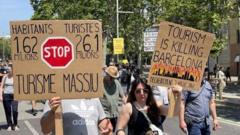In Barcelona, a city synonymous with vibrant culture and stunning architecture, tensions are brewing between residents and the influx of tourists. Amidst the picturesque streets and renowned attractions like the Sagrada Familia, demonstrators took to the streets this past Sunday, urging tourists to "Go Home!" as they paraded through central locations, showcasing their discontent with the growing numbers of visitors that many locals believe are suffocating their communities.
Protesters wielded signs that read "Your AirBnB used to be my home," highlighting the struggle of residents facing soaring rents and displacement due to short-term rental platforms and an influx of new arrivals seeking the Catalonia sun. Marina, a spokesperson for the demonstration, emphasized the need for moderation in tourism, declaring, "Our goal is not to stop tourism…but to have it at a normal rate." The increasing strain on housing has forced many locals to confront harsh realities, including impossible rental prices.
At 80 years of age, Pepi Viu found herself evicted from her home after nearly a decade, struggling to secure alternative housing amid a market that has skyrocketed by nearly 70% since her last lease. Exclaiming her frustration, she said, "I feel like I have no protection," drawing attention to the humanitarian concerns intertwined with commercial tourism.
Meanwhile, Joan Alvarez, another resident in the Gothic quarter, battles against being forced out of his family’s home. As property owners convert apartments into expensive tourist rentals, he insists, "It's not just about the money, it's the principle." The growing discontent among residents is palpable, emphasizing the essential question: who gets to live in these historic neighborhoods?
Landlords, facing increasing scrutiny from both protesters and authorities, are caught in the crossfire. Jesus Pereda, a landlord managing tourist rentals near major attractions, believes that tourists are scapegoats for deeper economic issues. He argues that remote workers and rising living costs are larger contributors to the housing crisis, advocating for a balanced approach that considers the economic benefits of tourism.
In response to pressure from protests, the Barcelona government announced plans to ban short-term rentals for tourists starting in 2028, putting thousands of landlords at risk of losing their tourism licenses. Protests in Barcelona echoed sentiments felt across southern Europe, with cities in Portugal and Italy experiencing similar disturbances. Residents are calling for a resolution to the tourism dilemma, as expectations for summer visitors in Spain surge.
As Barcelona grapples with its tourism identity, locals demand changes to protect their communities from being overrun by an unmanageable influx of visitors. With various perspectives highlighted, the debate continues on how to balance economic growth against the very real needs of long-time residents.
Protesters wielded signs that read "Your AirBnB used to be my home," highlighting the struggle of residents facing soaring rents and displacement due to short-term rental platforms and an influx of new arrivals seeking the Catalonia sun. Marina, a spokesperson for the demonstration, emphasized the need for moderation in tourism, declaring, "Our goal is not to stop tourism…but to have it at a normal rate." The increasing strain on housing has forced many locals to confront harsh realities, including impossible rental prices.
At 80 years of age, Pepi Viu found herself evicted from her home after nearly a decade, struggling to secure alternative housing amid a market that has skyrocketed by nearly 70% since her last lease. Exclaiming her frustration, she said, "I feel like I have no protection," drawing attention to the humanitarian concerns intertwined with commercial tourism.
Meanwhile, Joan Alvarez, another resident in the Gothic quarter, battles against being forced out of his family’s home. As property owners convert apartments into expensive tourist rentals, he insists, "It's not just about the money, it's the principle." The growing discontent among residents is palpable, emphasizing the essential question: who gets to live in these historic neighborhoods?
Landlords, facing increasing scrutiny from both protesters and authorities, are caught in the crossfire. Jesus Pereda, a landlord managing tourist rentals near major attractions, believes that tourists are scapegoats for deeper economic issues. He argues that remote workers and rising living costs are larger contributors to the housing crisis, advocating for a balanced approach that considers the economic benefits of tourism.
In response to pressure from protests, the Barcelona government announced plans to ban short-term rentals for tourists starting in 2028, putting thousands of landlords at risk of losing their tourism licenses. Protests in Barcelona echoed sentiments felt across southern Europe, with cities in Portugal and Italy experiencing similar disturbances. Residents are calling for a resolution to the tourism dilemma, as expectations for summer visitors in Spain surge.
As Barcelona grapples with its tourism identity, locals demand changes to protect their communities from being overrun by an unmanageable influx of visitors. With various perspectives highlighted, the debate continues on how to balance economic growth against the very real needs of long-time residents.




















